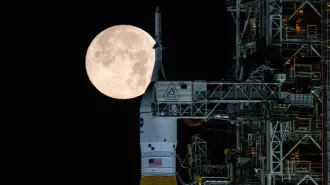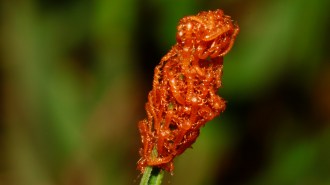Uncategorized
-
 Anthropology
AnthropologyWhen the fish stop biting, ice fishers follow the crowd
Study showcases how modern-day foragers stick together when seeking food. Such social forces could help explain the emergence of complex thinking.
By Sujata Gupta -
 Animals
AnimalsA bonobo’s imaginary tea party suggests apes can play pretend
Apes, like humans, are capable of pretend play, challenging long-held views about how animals think, a new study suggests.
By RJ Mackenzie -
 Neuroscience
NeuroscienceBabies brains’ can follow a beat as soon as they’re born
Brain scans and signals show babies can sort images and sense rhythm, offering new insight into how infant brains are wired from the start.
-
 Health & Medicine
Health & MedicineThe best way to help Alzheimer’s patients may be to help their caregivers
A mathematical model simulated patient outcomes when given caregiver support or an expensive Alzheimer’s drug to determine cost and health benefits.
-
 Health & Medicine
Health & MedicineGum disease bacteria can promote cancer growth in mice
In mice, the oral bacteria F. nucleatum can travel to mammary tissue via the bloodstream, where it can damage healthy cells.
By Meghan Rosen -
 Animals
AnimalsSome dung beetles dig deep to keep their eggs cool
A temperate tunneling species of dung beetle seems capable of adapting to climate change, but their tropical cousins may be less resilient.
-
 Space
SpaceArtemis II is returning humans to the moon with science riding shotgun
NASA’s Artemis II could be the first time human eyes set sight on the farside of the moon — and there are things human eyes can see that cameras can’t.
-
 Animals
AnimalsThese beetle larvae lure in bees by mimicking flowers
These parasitic beetle larvae lure in bees with complex floral aromas before hitching a ride back to their nests and eating their eggs.
-
 Artificial Intelligence
Artificial IntelligenceAI models spot deepfake images, but people catch fake videos
A new study finds that humans and AI spot different kinds of deepfakes — hinting at the need to team up to fight them.
By Aaron Brooks -
 Psychology
PsychologyWith effort, procrastinators can change
Procrastination in young adulthood is not set in stone, though change is difficult, a long-term study shows.
By Sujata Gupta -
 Health & Medicine
Health & MedicineWidespread use of HPV shots could mean fewer cervical cancer screenings
A modeling study of Norway, which has high HPV vaccination coverage and uniform cervical cancer screening, suggests fewer screens could be needed.
-
 Health & Medicine
Health & MedicinePoor sleep may account for a large share of dementia cases
Researchers estimate that roughly 12 percent of U.S. dementia cases could be tied to insomnia.